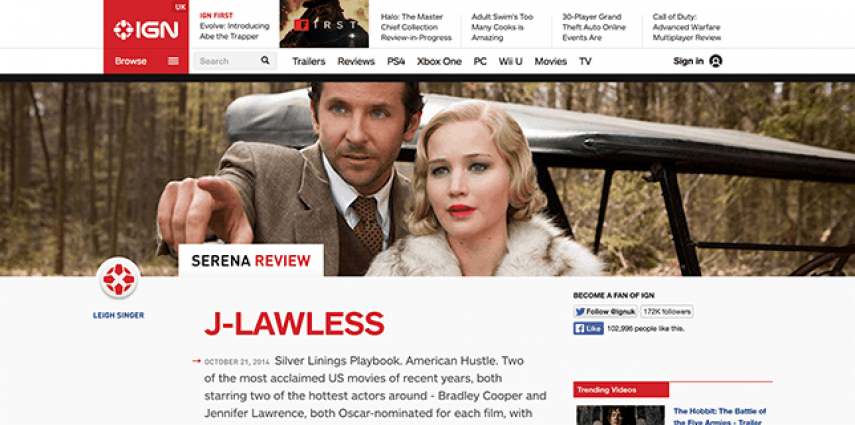Silver Linings Playbook. American Hustle. Two of the most acclaimed US movies of recent years, both starring two of the hottest actors around – Bradley Cooper and Jennifer Lawrence, both Oscar-nominated for each film, with Lawrence winning for Playbook. So when a third movie headlining America’s dream team is mysteriously delayed for two years (Serena was actually shot before American Hustle), something is definitely amiss. Crueller critics were gleefully anticipating a full-blown fiasco but Serena will disappoint them as well as most everybody else, failing even to be an epic failure. Instead it’s just slight and rather silly.
This is even more of a problem if you’re familiar with the source, Ron Rash’s 2008 bestselling novel, elegant in tone but ripe with frenzied passion, blood-soaked vengeance and hints of the supernatural. In the book, Serena and George Pemberton, timber barons in Depression-era North Carolina, ruthlessly wipe out both forests and anyone dumb enough to stand in their way. In the very first pages, George practically disembowels the irate father of the local girl he’s knocked up and abandoned, while Serena offers her that same knife as the only financial compensation on offer! By the end Serena is hell-bent on killing the child itself. Basically they’re the Macbeths of the logging world.
Onscreen, the movie guts this premise more thoroughly than book-George did the old fella (a scene notably absent here), softening the focus on J-Law and B-Coop and making them more victims of circumstance than villains. Beset by treacherous colleagues, pesky environmentalists, childbearing complications and a rogue panther, life sure is tough for these hardworking lovebirds. So when Serena does go off the deep end, aided by a clairvoyant local scout (Rhys Ifans), who senses something mystical about her, we’re meant to feel as sad as we are appalled.
Who knows if the filmmakers figured that Lawrence is too much of a national treasure to dirty down her image, or if they’d already decided to make Serena more relatable, but either way it’s a missed opportunity. In the flashes that she’s allowed, Lawrence shows she’d make a great femme fatale but largely defanging her is symptomatic of the film’s near-fatal flaw: turning an operatic melodrama into, if not a mellow drama, then certainly a far tamer, duller one.
It probably shouldn’t be a surprise. Danish director Susanne Bier’s intimate, character-driven stories – Open Hearts, Brothers, the Oscar-winning In A Better World – are grounded in psychological realism and effectively she and screenwriter Christopher Kyle have tried to shrink Serena down to that scale, while still clinging to some of the story’s more shocking elements – (George’s illegitimate kid is still on Serena’s hit list). The effect is jarring.
It’s a rookie error to review the film you feel should have been made, rather than the one you actually see, but it’s also too tempting to imagine what full-blooded filmmakers like Scorsese or Darren Aronofsky (at one time, attached with Angelina Jolie to star) might have done with a more pedal-to-the-metal approach to the material. Instead, it’s as if Bier’s doing a road safety demonstration at a demolition derby. No wonder the film’s engine stalls.
If the movie still has any power to surprise or delight, it’ll be largely because audiences familiar with Lawrence and Cooper’s likability, even when playing duplicitous (American Hustle), won’t expect the film to play as rough as it still does. The beginning is also pleasingly deceptive, set up as a handsome period romance. And though saddled with a mysterious, tragic past, Serena quickly proves herself to be a thoroughly modern figure: an outspoken, forward-thinking businesswoman, whose novel way of dealing with a rattlesnake problem is to import an eagle and train him to kill them. Try finding that on the syllabus at the then-boys club of Harvard Business School.
These aspects, though, and others like cinematographer Morton Soborg’s mist-steeped, dreamlike rendering of the Czech forest locations (ably subbing for North Carolina), remain incidental pleasures. There’s simply not enough heat generated by the leads’ diluted characters – a real shame, given their Silver Linings Playbook sparks – and the film plods docilely along until climactic events overwhelm it: fire, murder and an invented symbolic death so ludicrous that the closest thing to it is one suffered by Robert Goulet at the end of The Naked Gun 2½. Except here, it’s played deadly straight, which only makes it funnier. Still, even one, inadvertent laugh in such a self-serious film is a good start.
Become a fan of IGN
The Verdict
A good-looking but flat period piece whose neutered telling renders its nutty narrative increasingly hard to believe and harder to care about. A distant third place in the Cooper/Lawrence playbook, the only silver lining is that audiences will soon forget all about it.
—
